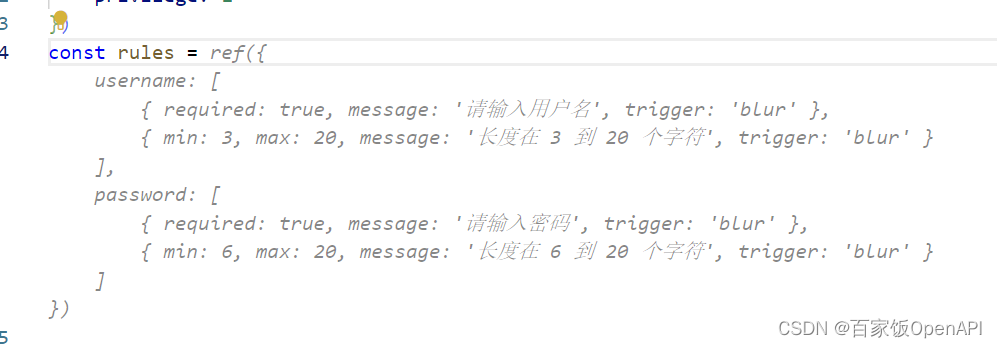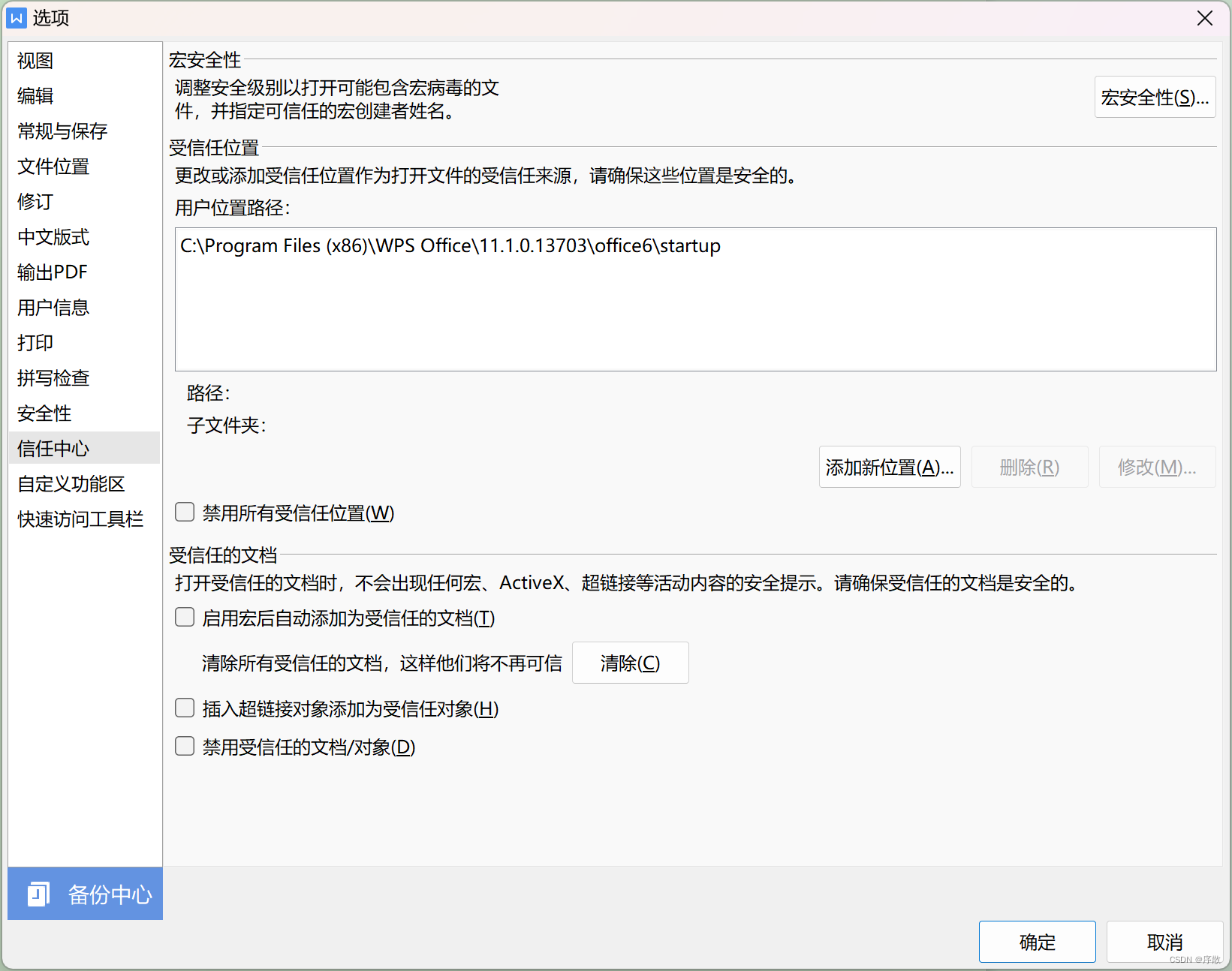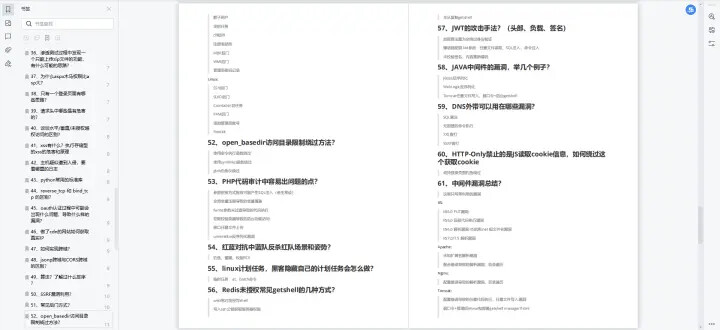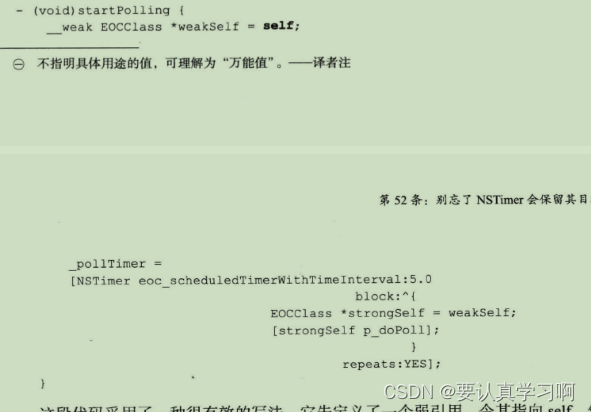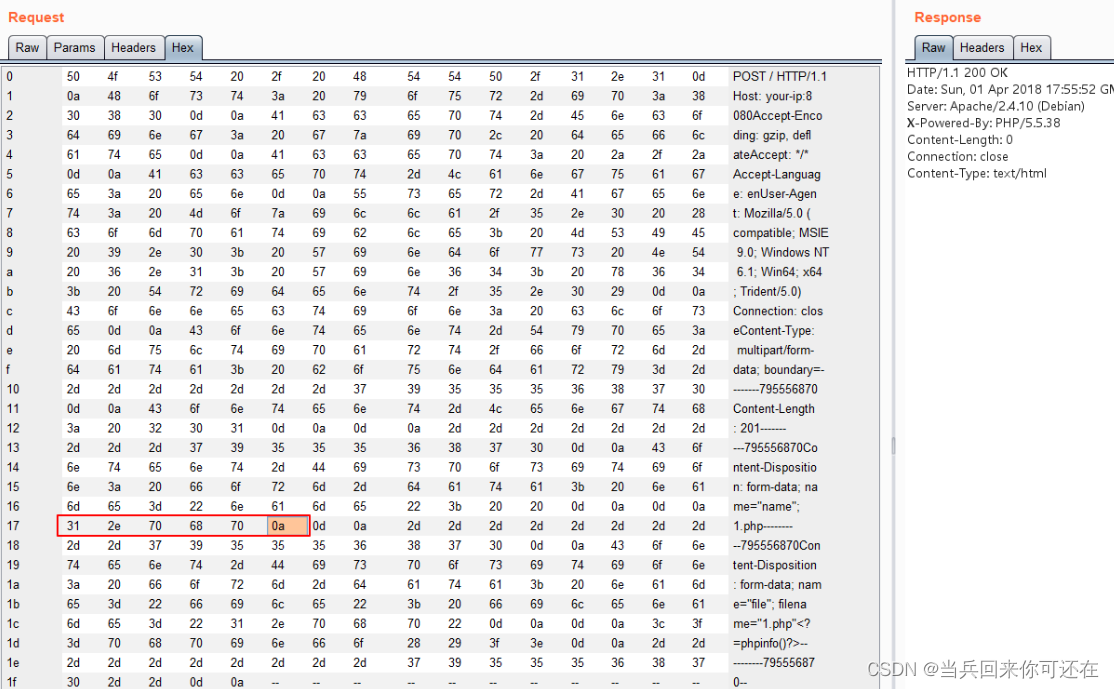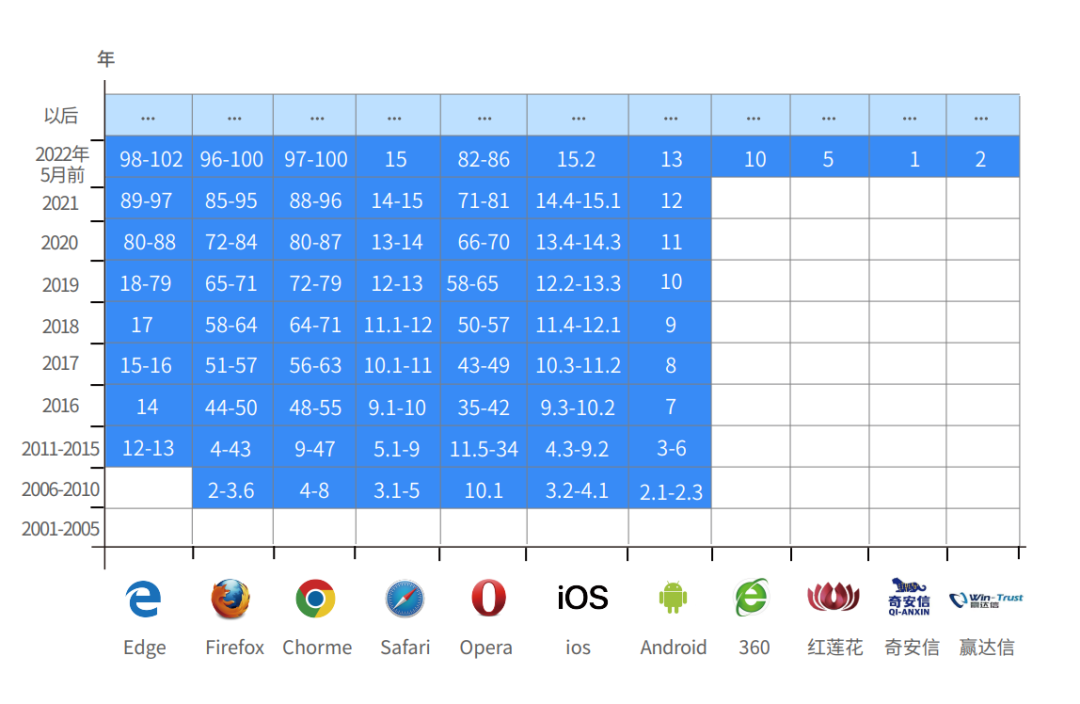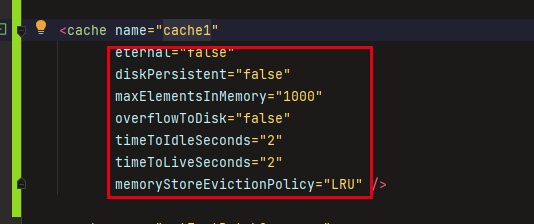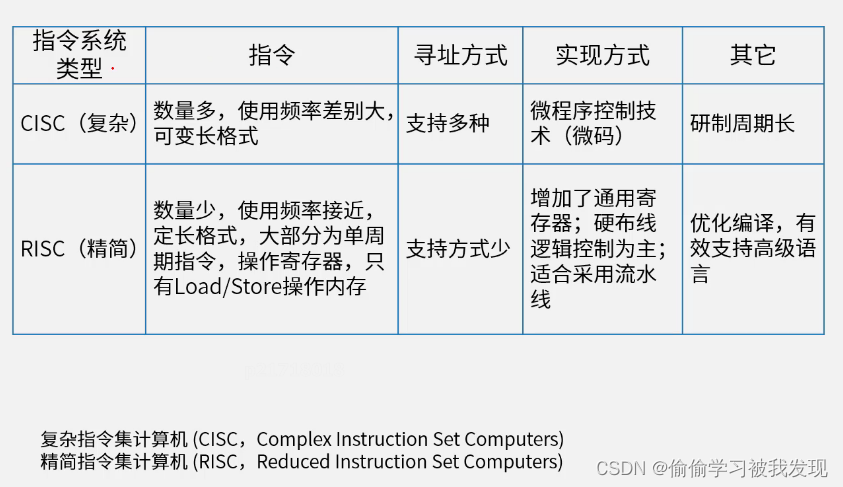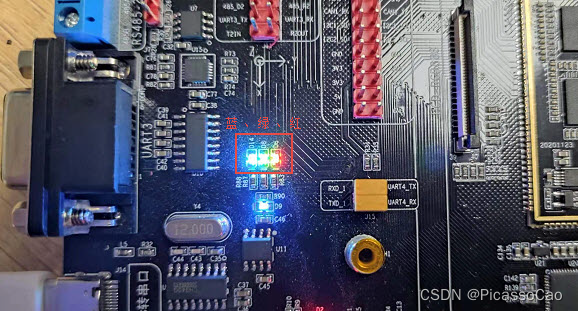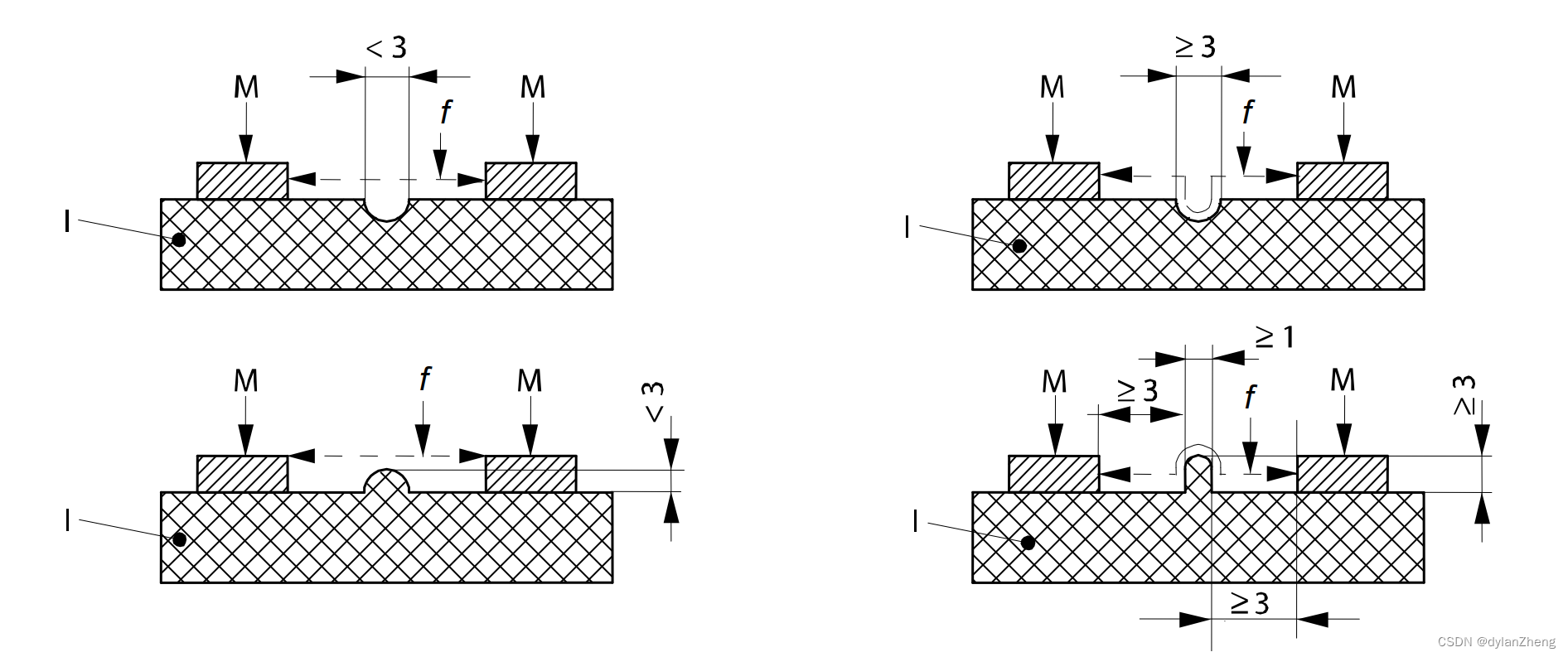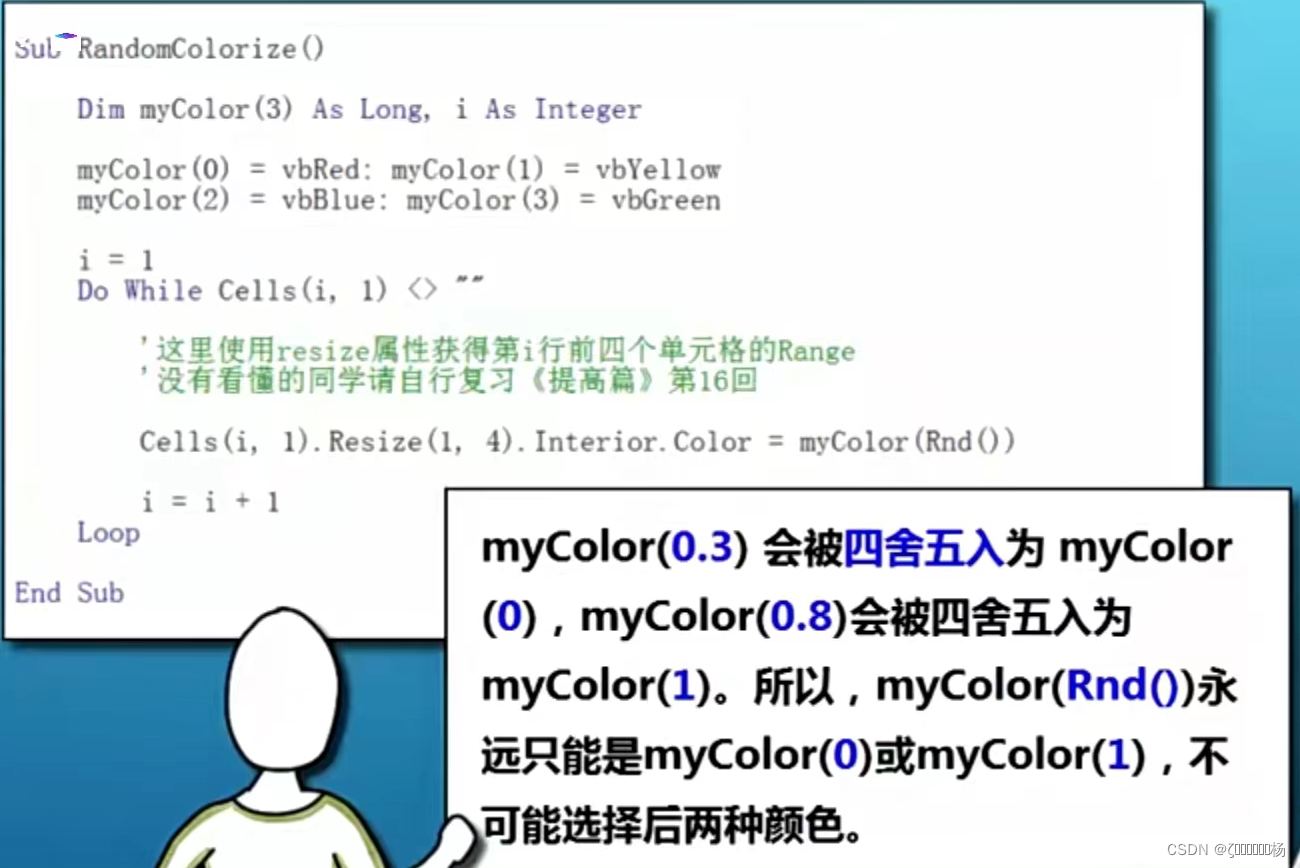ESP-IDF:在客户网页上实现拍照按钮功能,并跳转新页面显示图片
核心代码:
/* Send response with custom headers and body set as the
* string passed in user context*/
//const char* resp_str = (const char*) req->user_ctx;
const char *resp_str_head = "<!doctype html><html><body>";
const char *resp_str_body = "<strong><font color=\"red\">Hello World!</font></strong><br/>";
//const char *resp_str_button = "<input type=\"button\" value=\"capture button\" onclick=\"javascrtpt:window.location.href='192.168.4.1/capture'\" ";
const char *resp_str_button = "<a href = \"http:\/\/192.168.4.1/capture\" target=\"_blank\"> <button>capture</button></a>";
const char *resp_str_end = "</body></html>";
char *bufmichael;
size_t buf_len_michael = 512;
bufmichael = malloc(buf_len_michael);
snprintf(bufmichael,buf_len_michael,resp_str_head);
snprintf(bufmichael+strlen(bufmichael),buf_len_michael,resp_str_body);
snprintf(bufmichael+strlen(bufmichael),buf_len_michael,resp_str_button);
snprintf(bufmichael+strlen(bufmichael),buf_len_michael,resp_str_end);
httpd_resp_send(req, bufmichael, HTTPD_RESP_USE_STRLEN);
free(bufmichael);

功能实现:
地址栏输入192.168.4.1/hello进入hello World!页面
点击capture按钮会跳转到capture页面,启动摄像头抓拍一个图片显示出来。
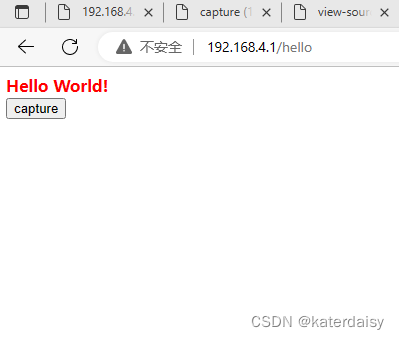
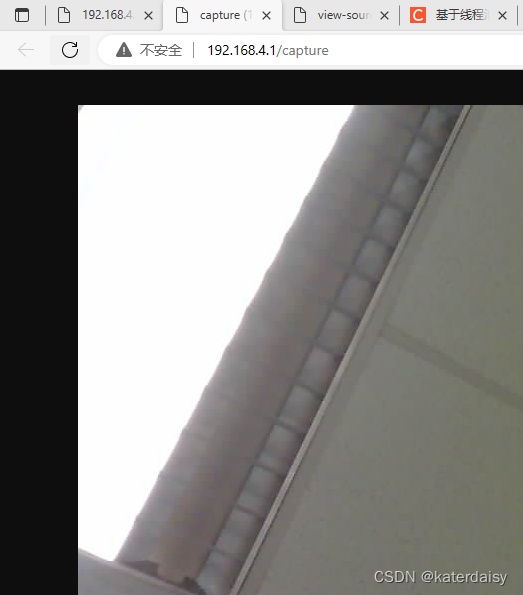
完整代码:
首先app_wifi_main();app_camera_main();这两个组件要先编译通过。
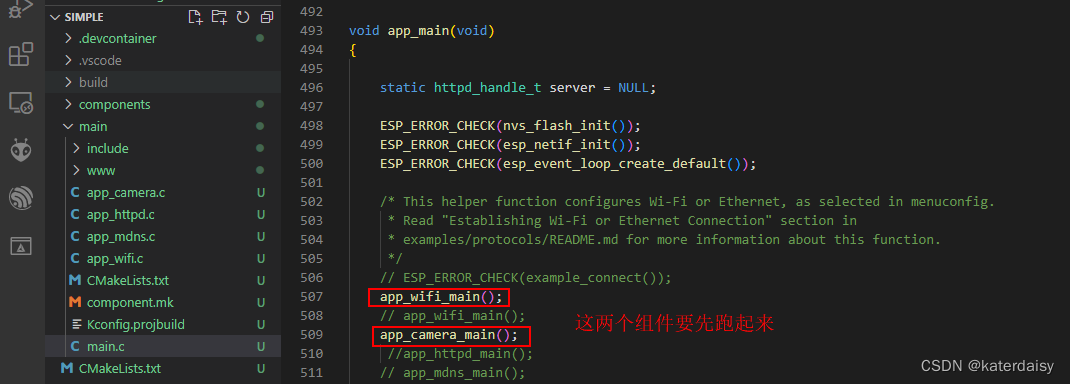
/* Simple HTTP Server Example
This example code is in the Public Domain (or CC0 licensed, at your option.)
Unless required by applicable law or agreed to in writing, this
software is distributed on an “AS IS” BASIS, WITHOUT WARRANTIES OR
CONDITIONS OF ANY KIND, either express or implied.
*/
#include <esp_wifi.h>
#include <esp_event.h>
#include <esp_log.h>
#include <esp_system.h>
#include <nvs_flash.h>
#include <sys/param.h>
#include “nvs_flash.h”
#include “esp_netif.h”
#include “esp_eth.h”
#include “protocol_examples_common.h”
#include “esp_tls_crypto.h”
#include <esp_http_server.h>
// #include “app_wifi.h”
#include “esp_camera.h” //michael add
#include “app_camera.h”
#include “app_wifi.h”
#include “app_httpd.h”
#include “app_mdns.h”
/* A simple example that demonstrates how to create GET and POST
- handlers for the web server.
*/
static const char *TAG = “example”;
#if CONFIG_EXAMPLE_BASIC_AUTH
typedef struct
{
char *username;
char *password;
} basic_auth_info_t;
#define HTTPD_401 “401 UNAUTHORIZED” /*!< HTTP Response 401 */
static char *http_auth_basic(const char *username, const char *password)
{
int out;
char *user_info = NULL;
char *digest = NULL;
size_t n = 0;
asprintf(&user_info, “%s:%s”, username, password);
if (!user_info)
{
ESP_LOGE(TAG, “No enough memory for user information”);
return NULL;
}
esp_crypto_base64_encode(NULL, 0, &n, (const unsigned char *)user_info, strlen(user_info));
/* 6: The length of the "Basic " string
* n: Number of bytes for a base64 encode format
* 1: Number of bytes for a reserved which be used to fill zero
*/
digest = calloc(1, 6 + n + 1);
if (digest)
{
strcpy(digest, "Basic ");
esp_crypto_base64_encode((unsigned char *)digest + 6, n, (size_t *)&out, (const unsigned char *)user_info, strlen(user_info));
}
free(user_info);
return digest;
}
/* An HTTP GET handler */
static esp_err_t basic_auth_get_handler(httpd_req_t *req)
{
char *buf = NULL;
size_t buf_len = 0;
basic_auth_info_t *basic_auth_info = req->user_ctx;
buf_len = httpd_req_get_hdr_value_len(req, "Authorization") + 1;
if (buf_len > 1)
{
buf = calloc(1, buf_len);
if (!buf)
{
ESP_LOGE(TAG, "No enough memory for basic authorization");
return ESP_ERR_NO_MEM;
}
if (httpd_req_get_hdr_value_str(req, "Authorization", buf, buf_len) == ESP_OK)
{
ESP_LOGI(TAG, "Found header => Authorization: %s", buf);
}
else
{
ESP_LOGE(TAG, "No auth value received");
}
char *auth_credentials = http_auth_basic(basic_auth_info->username, basic_auth_info->password);
if (!auth_credentials)
{
ESP_LOGE(TAG, "No enough memory for basic authorization credentials");
free(buf);
return ESP_ERR_NO_MEM;
}
if (strncmp(auth_credentials, buf, buf_len))
{
ESP_LOGE(TAG, "Not authenticated");
httpd_resp_set_status(req, HTTPD_401);
httpd_resp_set_type(req, "application/json");
httpd_resp_set_hdr(req, "Connection", "keep-alive");
httpd_resp_set_hdr(req, "WWW-Authenticate", "Basic realm=\"Hello\"");
httpd_resp_send(req, NULL, 0);
}
else
{
ESP_LOGI(TAG, "Authenticated!");
char *basic_auth_resp = NULL;
httpd_resp_set_status(req, HTTPD_200);
httpd_resp_set_type(req, "application/json");
httpd_resp_set_hdr(req, "Connection", "keep-alive");
asprintf(&basic_auth_resp, "{\"authenticated\": true,\"user\": \"%s\"}", basic_auth_info->username);
if (!basic_auth_resp)
{
ESP_LOGE(TAG, "No enough memory for basic authorization response");
free(auth_credentials);
free(buf);
return ESP_ERR_NO_MEM;
}
httpd_resp_send(req, basic_auth_resp, strlen(basic_auth_resp));
free(basic_auth_resp);
}
free(auth_credentials);
free(buf);
}
else
{
ESP_LOGE(TAG, "No auth header received");
httpd_resp_set_status(req, HTTPD_401);
httpd_resp_set_type(req, "application/json");
httpd_resp_set_hdr(req, "Connection", "keep-alive");
httpd_resp_set_hdr(req, "WWW-Authenticate", "Basic realm=\"Hello\"");
httpd_resp_send(req, NULL, 0);
}
return ESP_OK;
}
static httpd_uri_t basic_auth = {
.uri = “/basic_auth”,
.method = HTTP_GET,
.handler = basic_auth_get_handler,
};
static void httpd_register_basic_auth(httpd_handle_t server)
{
basic_auth_info_t *basic_auth_info = calloc(1, sizeof(basic_auth_info_t));
if (basic_auth_info)
{
basic_auth_info->username = CONFIG_EXAMPLE_BASIC_AUTH_USERNAME;
basic_auth_info->password = CONFIG_EXAMPLE_BASIC_AUTH_PASSWORD;
basic_auth.user_ctx = basic_auth_info;
httpd_register_uri_handler(server, &basic_auth);
}
}
#endif
/* An HTTP GET handler */
static esp_err_t hello_get_handler(httpd_req_t *req)
{
char *buf;
size_t buf_len;
/* Get header value string length and allocate memory for length + 1,
* extra byte for null termination */
buf_len = httpd_req_get_hdr_value_len(req, "Host") + 1;
if (buf_len > 1)
{
buf = malloc(buf_len);
/* Copy null terminated value string into buffer */
if (httpd_req_get_hdr_value_str(req, "Host", buf, buf_len) == ESP_OK)
{
ESP_LOGI(TAG, "Found header => Host: %s", buf);
}
free(buf);
}
buf_len = httpd_req_get_hdr_value_len(req, "Test-Header-2") + 1;
if (buf_len > 1)
{
buf = malloc(buf_len);
if (httpd_req_get_hdr_value_str(req, "Test-Header-2", buf, buf_len) == ESP_OK)
{
ESP_LOGI(TAG, "Found header => Test-Header-2: %s", buf);
}
free(buf);
}
buf_len = httpd_req_get_hdr_value_len(req, "Test-Header-1") + 1;
if (buf_len > 1)
{
buf = malloc(buf_len);
if (httpd_req_get_hdr_value_str(req, "Test-Header-1", buf, buf_len) == ESP_OK)
{
ESP_LOGI(TAG, "Found header => Test-Header-1: %s", buf);
}
free(buf);
}
/* Read URL query string length and allocate memory for length + 1,
* extra byte for null termination */
buf_len = httpd_req_get_url_query_len(req) + 1;
if (buf_len > 1)
{
buf = malloc(buf_len);
if (httpd_req_get_url_query_str(req, buf, buf_len) == ESP_OK)
{
ESP_LOGI(TAG, "Found URL query => %s", buf);
char param[32];
/* Get value of expected key from query string */
if (httpd_query_key_value(buf, "query1", param, sizeof(param)) == ESP_OK)
{
ESP_LOGI(TAG, "Found URL query parameter => query1=%s", param);
}
if (httpd_query_key_value(buf, "query3", param, sizeof(param)) == ESP_OK)
{
ESP_LOGI(TAG, "Found URL query parameter => query3=%s", param);
}
if (httpd_query_key_value(buf, "query2", param, sizeof(param)) == ESP_OK)
{
ESP_LOGI(TAG, "Found URL query parameter => query2=%s", param);
}
}
free(buf);
}
/* Set some custom headers */
httpd_resp_set_hdr(req, "Custom-Header-1", "Custom-Value-1");
httpd_resp_set_hdr(req, "Custom-Header-2", "Custom-Value-2");
/* Send response with custom headers and body set as the
* string passed in user context*/
//const char* resp_str = (const char*) req->user_ctx;
const char *resp_str_head = "<!doctype html><html><body>";
const char *resp_str_body = "<strong><font color=\"red\">Hello World!</font></strong><br/>";
//const char *resp_str_button = "<input type=\"button\" value=\"capture button\" onclick=\"javascrtpt:window.location.href='192.168.4.1/capture'\" ";
const char *resp_str_button = "<a href = \"http:\/\/192.168.4.1/capture\" target=\"_blank\"> <button>capture</button></a>";
const char *resp_str_end = "</body></html>";
char *bufmichael;
size_t buf_len_michael = 512;
bufmichael = malloc(buf_len_michael);
snprintf(bufmichael,buf_len_michael,resp_str_head);
snprintf(bufmichael+strlen(bufmichael),buf_len_michael,resp_str_body);
snprintf(bufmichael+strlen(bufmichael),buf_len_michael,resp_str_button);
snprintf(bufmichael+strlen(bufmichael),buf_len_michael,resp_str_end);
httpd_resp_send(req, bufmichael, HTTPD_RESP_USE_STRLEN);
free(bufmichael);
/* After sending the HTTP response the old HTTP request
* headers are lost. Check if HTTP request headers can be read now. */
if (httpd_req_get_hdr_value_len(req, "Host") == 0)
{
ESP_LOGI(TAG, "Request headers lost");
}
return ESP_OK;
}
static const httpd_uri_t hello = {
.uri = “/hello”,
.method = HTTP_GET,
.handler = hello_get_handler,
/* Let’s pass response string in user
* context to demonstrate it’s usage */
.user_ctx = “Hello World!”};
static esp_err_t capture_handler(httpd_req_t *req) // michael add
{
ESP_LOGI(TAG, “in main.c capture start, michael add”); // michael add
camera_fb_t *fb = NULL;
esp_err_t res = ESP_OK;
fb = esp_camera_fb_get();
if (!fb)
{
ESP_LOGE(TAG, "Camera capture failed");
httpd_resp_send_500(req);
return ESP_FAIL;
}
ESP_LOGI(TAG, "capture : httpd_resp_set_type , michael add"); // michael add
httpd_resp_set_type(req, "image/jpeg");
httpd_resp_set_hdr(req, "Content-Disposition", "inline; filename=capture.jpg");
httpd_resp_set_hdr(req, "Access-Control-Allow-Origin", "*");
ESP_LOGI(TAG, "capture : fb->width is: %d , michael add", fb->width); // michael add
size_t fb_len = 0;
if (fb->format == PIXFORMAT_JPEG)
{
fb_len = fb->len;
res = httpd_resp_send(req, (const char *)fb->buf, fb->len);
}
esp_camera_fb_return(fb);
return res;
}
static const httpd_uri_t capture = { // michael add
.uri = “/capture”,
.method = HTTP_GET,
.handler = capture_handler,
.user_ctx = NULL};
/* An HTTP POST handler */
static esp_err_t echo_post_handler(httpd_req_t *req)
{
char buf[100];
int ret, remaining = req->content_len;
while (remaining > 0)
{
/* Read the data for the request */
if ((ret = httpd_req_recv(req, buf,
MIN(remaining, sizeof(buf)))) <= 0)
{
if (ret == HTTPD_SOCK_ERR_TIMEOUT)
{
/* Retry receiving if timeout occurred */
continue;
}
return ESP_FAIL;
}
/* Send back the same data */
httpd_resp_send_chunk(req, buf, ret);
remaining -= ret;
/* Log data received */
ESP_LOGI(TAG, "=========== RECEIVED DATA ==========");
ESP_LOGI(TAG, "%.*s", ret, buf);
ESP_LOGI(TAG, "====================================");
}
// End response
httpd_resp_send_chunk(req, NULL, 0);
return ESP_OK;
}
static const httpd_uri_t echo = {
.uri = “/echo”,
.method = HTTP_POST,
.handler = echo_post_handler,
.user_ctx = NULL};
/* This handler allows the custom error handling functionality to be
- tested from client side. For that, when a PUT request 0 is sent to
- URI /ctrl, the /hello and /echo URIs are unregistered and following
- custom error handler http_404_error_handler() is registered.
- Afterwards, when /hello or /echo is requested, this custom error
- handler is invoked which, after sending an error message to client,
- either closes the underlying socket (when requested URI is /echo)
- or keeps it open (when requested URI is /hello). This allows the
- client to infer if the custom error handler is functioning as expected
- by observing the socket state.
*/
esp_err_t http_404_error_handler(httpd_req_t req, httpd_err_code_t err)
{
if (strcmp(“/hello”, req->uri) == 0)
{
httpd_resp_send_err(req, HTTPD_404_NOT_FOUND, “/hello URI is not available”);
/ Return ESP_OK to keep underlying socket open /
return ESP_OK;
}
else if (strcmp(“/echo”, req->uri) == 0)
{
httpd_resp_send_err(req, HTTPD_404_NOT_FOUND, “/echo URI is not available”);
/ Return ESP_FAIL to close underlying socket /
return ESP_FAIL;
}
/ For any other URI send 404 and close socket */
httpd_resp_send_err(req, HTTPD_404_NOT_FOUND, “Some 404 error message”);
return ESP_FAIL;
}
/* An HTTP PUT handler. This demonstrates realtime
-
registration and deregistration of URI handlers
*/
static esp_err_t ctrl_put_handler(httpd_req_t *req)
{
char buf;
int ret;if ((ret = httpd_req_recv(req, &buf, 1)) <= 0)
{
if (ret == HTTPD_SOCK_ERR_TIMEOUT)
{
httpd_resp_send_408(req);
}
return ESP_FAIL;
}if (buf == ‘0’)
{
/* URI handlers can be unregistered using the uri string /
ESP_LOGI(TAG, “Unregistering /hello and /echo URIs”);
httpd_unregister_uri(req->handle, “/hello”);
httpd_unregister_uri(req->handle, “/echo”);
// httpd_unregister_uri(req->handle, “/capture”); // michael add
/ Register the custom error handler /
httpd_register_err_handler(req->handle, HTTPD_404_NOT_FOUND, http_404_error_handler);
}
else
{
ESP_LOGI(TAG, “Registering /hello and /echo URIs”);
httpd_register_uri_handler(req->handle, &hello);
httpd_register_uri_handler(req->handle, &echo);
// httpd_register_uri_handler(req->handle, &capture); // michael add
/ Unregister custom error handler */
httpd_register_err_handler(req->handle, HTTPD_404_NOT_FOUND, NULL);
}/* Respond with empty body */
httpd_resp_send(req, NULL, 0);
return ESP_OK;
}
static const httpd_uri_t ctrl = {
.uri = “/ctrl”,
.method = HTTP_PUT,
.handler = ctrl_put_handler,
.user_ctx = NULL};
static httpd_handle_t start_webserver(void)
{
httpd_handle_t server = NULL;
httpd_config_t config = HTTPD_DEFAULT_CONFIG();
config.lru_purge_enable = true;
// Start the httpd server
ESP_LOGI(TAG, "Starting server on port: '%d'", config.server_port);
if (httpd_start(&server, &config) == ESP_OK)
{
// Set URI handlers
ESP_LOGI(TAG, "Registering URI handlers");
httpd_register_uri_handler(server, &hello);
httpd_register_uri_handler(server, &echo);
httpd_register_uri_handler(server, &ctrl);
httpd_register_uri_handler(server, &capture); // michael add
#if CONFIG_EXAMPLE_BASIC_AUTH
httpd_register_basic_auth(server);
#endif
return server;
}
ESP_LOGI(TAG, "Error starting server!");
return NULL;
}
static void stop_webserver(httpd_handle_t server)
{
// Stop the httpd server
httpd_stop(server);
}
static void disconnect_handler(void *arg, esp_event_base_t event_base,
int32_t event_id, void *event_data)
{
httpd_handle_t *server = (httpd_handle_t *)arg;
if (*server)
{
ESP_LOGI(TAG, “Stopping webserver”);
stop_webserver(*server);
*server = NULL;
}
}
static void connect_handler(void *arg, esp_event_base_t event_base,
int32_t event_id, void *event_data)
{
httpd_handle_t *server = (httpd_handle_t *)arg;
if (*server == NULL)
{
ESP_LOGI(TAG, “Starting webserver”);
*server = start_webserver();
}
}
void app_main(void)
{
static httpd_handle_t server = NULL;
ESP_ERROR_CHECK(nvs_flash_init());
ESP_ERROR_CHECK(esp_netif_init());
ESP_ERROR_CHECK(esp_event_loop_create_default());
/* This helper function configures Wi-Fi or Ethernet, as selected in menuconfig.
* Read "Establishing Wi-Fi or Ethernet Connection" section in
* examples/protocols/README.md for more information about this function.
*/
// ESP_ERROR_CHECK(example_connect());
app_wifi_main();
// app_wifi_main();
app_camera_main();
//app_httpd_main();
// app_mdns_main();
/* Register event handlers to stop the server when Wi-Fi or Ethernet is disconnected,
* and re-start it upon connection.
*/
#ifdef CONFIG_EXAMPLE_CONNECT_WIFI
ESP_ERROR_CHECK(esp_event_handler_register(IP_EVENT, IP_EVENT_STA_GOT_IP, &connect_handler, &server));
ESP_ERROR_CHECK(esp_event_handler_register(WIFI_EVENT, WIFI_EVENT_STA_DISCONNECTED, &disconnect_handler, &server));
#endif // CONFIG_EXAMPLE_CONNECT_WIFI
#ifdef CONFIG_EXAMPLE_CONNECT_ETHERNET
ESP_ERROR_CHECK(esp_event_handler_register(IP_EVENT, IP_EVENT_ETH_GOT_IP, &connect_handler, &server));
ESP_ERROR_CHECK(esp_event_handler_register(ETH_EVENT, ETHERNET_EVENT_DISCONNECTED, &disconnect_handler, &server));
#endif // CONFIG_EXAMPLE_CONNECT_ETHERNET
/* Start the server for the first time */
server = start_webserver();
}

